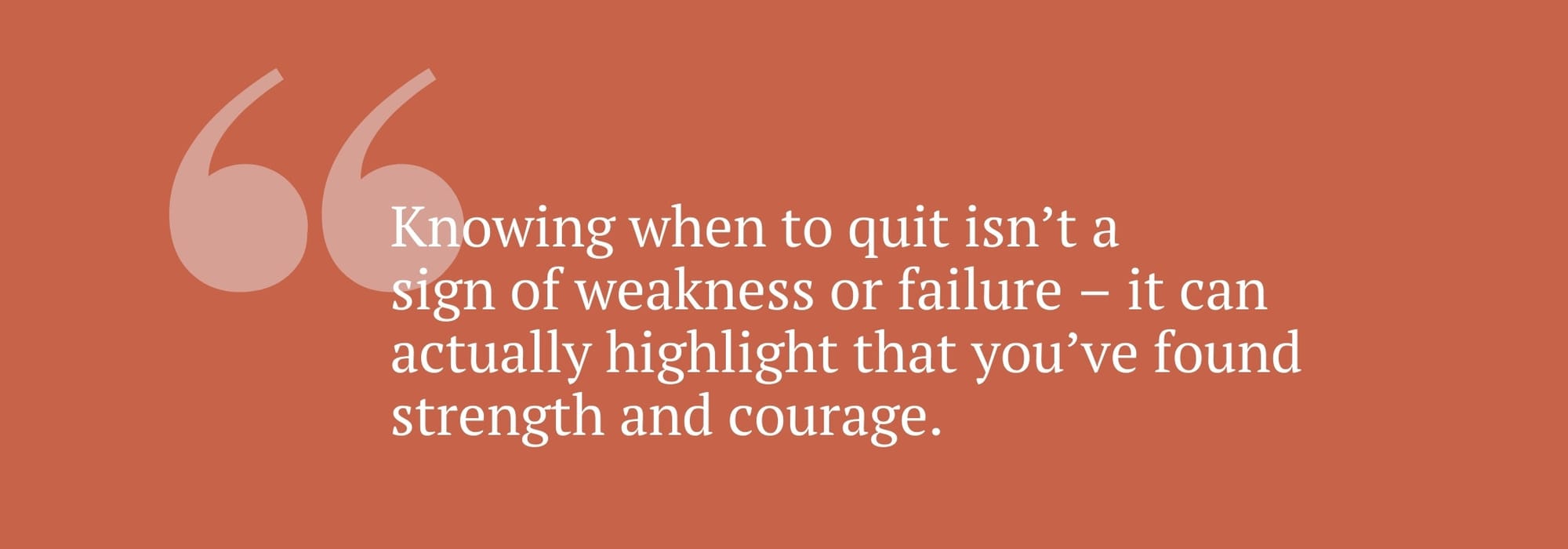Recognising it’s time to quit, and knowing what to do about it, are two very different things. Whether it’s ditching unhealthy habits, or making room for new romantic relationships, we share what you can do when you think it’s time to call it a day
Making big changes can be daunting. Whether a relationship has run its course, or you’re hoping to break unhelpful habits, it can be tough to know where to start. Recognising when it’s time to make a change – and that it’s OK to stop and do something more helpful with your time – is key.
Often ‘quitting’ has negative connotations – that giving up is a weakness. But this is definitely not the case. Acknowledging that something is not serving you, and having the strength to let it go, walk away, or make a proactive change, is monumental, and certainly something to be proud of. To help you step into this more positive association with ‘being a quitter’, we’re sharing four key areas where it can be tough to know when quitting could be the answer, and explain how (and where) you can find help for the next steps.
Ending a relationship
If you’re struggling to decide if you should end a relationship, ask yourself: do I know why I am staying? Am I in love, or am I afraid of being alone? Do I feel obligated to stay, or do I enjoy spending time with my partner? Is this a temporary low, or have I felt this way for a while?
Sometimes, we put up with things we know aren’t good for us – or relationships that we know, deep down, have run their course – because we’re afraid of what else is out there, or don’t know what our other options are. What’s familiar can be comforting, even when we know it’s not bringing out the best in us. So, many of us stay, even if, in reality, there are toxic behaviours present, poor communication, perhaps a lack or loss of trust, different life goals, or simply we’ve grown apart.
Making decisions in the heat of the moment is rarely the answer. Ensuring you have a strong support network of friends and family you can talk with in confidence can be a huge help. Getting an outside perspective can be tough, but it can offer new ways of viewing concerns, and can help you to find the right approach for you. Relationship charity Relate has some great free tools, including simple questions to help you if you are thinking of breaking up, as well as offering free counselling through some partnerships, and reduced fees for therapy for those on low income.
And if you don’t feel ready to open up with others yet, you can take time with your own thoughts. This might be through journaling (for your eyes only), where you write about anything that comes to mind when you think about relationships – from your vision of an ‘ideal one’ to daily behaviours, the future you imagine, or how they make you feel. Reflect on whether this aligns with the current picture of your relationship. If not, could this be attained through communication, or is the divide too great?

Giving up alcohol
There can be a clear moment when you know it’s time to give up alcohol. Other times, unhealthy drinking habits slowly creep in, until you realise what was once a conscious decision has become an unhealthy crutch you rely on. If you find yourself hiding your drinking, relying on alcohol after stressful events, or drastically increasing how much you consume, these can be just a few of the signs you might need help.
Online and in-person support groups can help you to connect with others, while giving you the chance to talk about your experiences. Mental health charity Mind has a comprehensive list of alcohol support organisations that provide specialised assistance during this difficult transition.
While not a substitute for professional help, podcasts can complement your journey by offering insights into others’ experiences with alcohol. The ‘Over The Influence’ podcast focuses on candid discussions with those who’ve re-evaluated their relationship with alcohol, while the ‘Club Soda’ podcast focuses on drinking more mindfully, and living well. Of course, if you are concerned about your drinking habits, it’s always worth speaking to your doctor first for support.
Quitting your job
Whether you feel you aren’t being paid enough, don’t get along with your manager, or are looking to find something more fulfilling, there are many reasons you might want to change jobs. It might even be that you’ve always had that one big career goal or business idea you’ve been too scared to pursue. Giving up your job and knowing when it’s time to make a change, can be scary, but sometimes, it can be the best thing you can do.
Start by thinking about why you want to quit. Knowing this can be helpful in deciding your next steps. If your current role lacks opportunities for growth, could a discussion with your manager address this, or moving to another role? If money is the issue, would changing companies guarantee you a higher salary, or is a complete career move required?
Working with a coach or mentor can help you to better understand what you want from your work life, and skills you may need to develop to get there. This person can help you to identify goals, learn about potential career paths that match your skillset, along with guiding you based on personal experience. Some larger employers also offer peer mentoring programmes for employees.
If you aren’t sure where you are going, or what your wider life goals should be, a personal development coach can help you develop your longer term aspirations, evaluate life changes, assess your strengths and weaknesses, and rediscover your purpose in life. You can search for coaches who resonate with and could support you on the Life Coach Directory.

Ditching ‘diet talk’
From video updates on someone’s ‘Ozempic journey’ to another headline criticising a celebrity’s appearance, or simply a friend turning down a sweet treat as they’re working on their ‘summer body’, diet talk is as pervasive as ever. And, the reason it’s dangerous is because it’s become so normalised that we don’t always consciously pick up on it.
A 2020 study, published in Body Image, noted that 94% of women and 90% of men experienced at least one form of ‘weight talk’, with mothers being the prevalent source (85% for women; 80% for men), followed by peers (72% for women; 66% for men), and fathers (54% for women; 57% for men). This highlights a generational cycle that we actively need to break free from.
To start, you need to be able to recognise it. You may want to keep a mood tracker or journal to spot patterns in diet talk, when they arise, and the impact on your self-esteem or choices that day. This can help you pick up on it, and reaffirm why you want to make changes. It may help to plan out a few conversation redirects for when dialogue enters an uncomfortable territory (such as “Actually, I’ve been meaning to ask you about…”), or statements to set firm boundaries (like “Talking about weight and diets can be triggering for me. Can we focus on something else?”).
Secondly, we need to reframe our relationship with food and our bodies. Rather than thinking of food or exercise as means of punishing ourselves, when we appreciate how incredible our bodies are, it can make taking care of them much easier. That way, you can focus on sustainable changes that support your health in the long-term, rather than falling for fad diets or restricting.
While these tips can help, if you experience persistent negative thoughts about food or body image that significantly impact daily functioning, talk to your GP.
Is it time to quit?
Knowing when to quit isn’t a sign of weakness or failure – it can actually highlight that you’ve found strength and courage to move forward in your life. Whether you’re ready to make changes today, or having these conversations and reviewing your position helps you recognise smaller actions you want to take first, this an important step – and shows a huge amount of respect and care that your future self will thank you for.


Comments